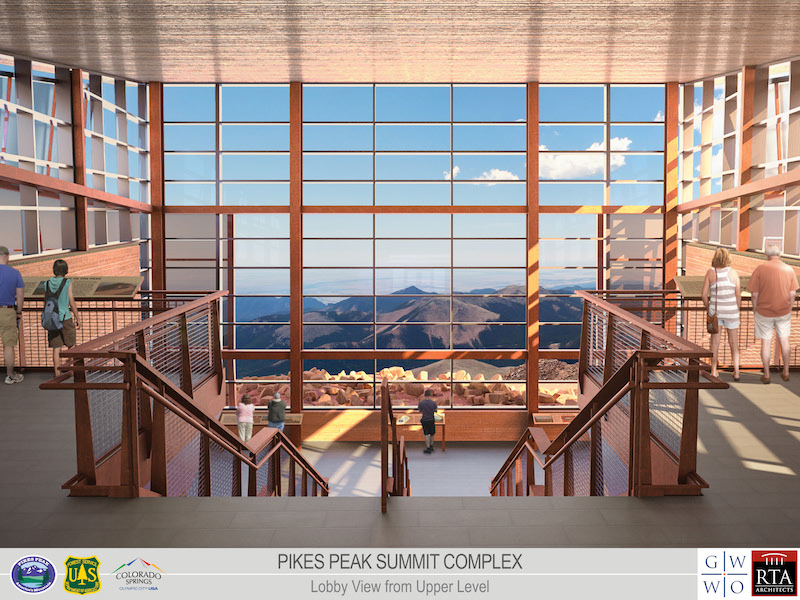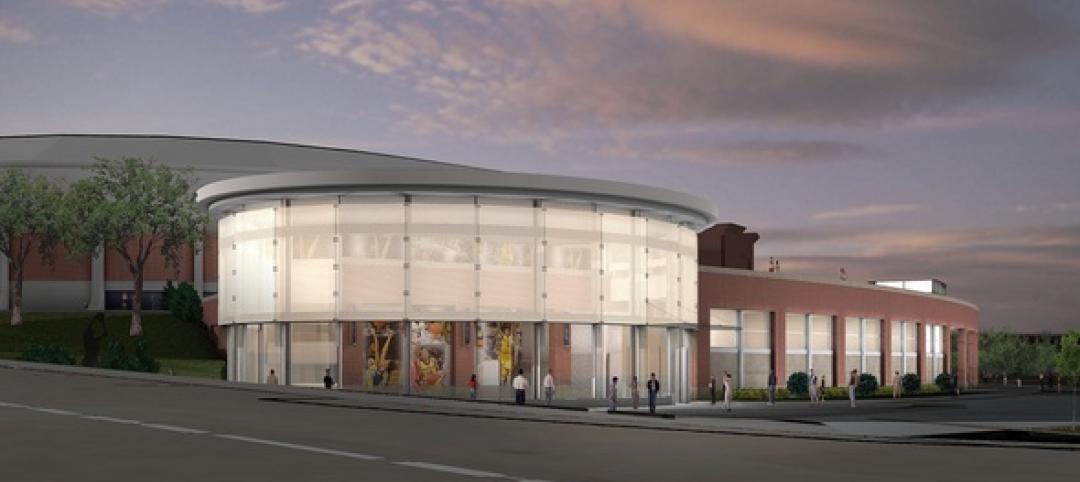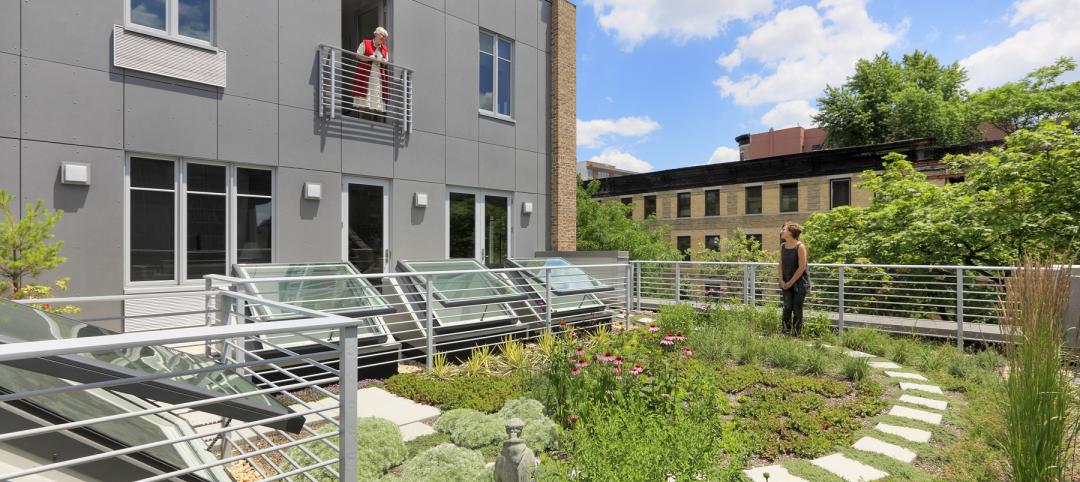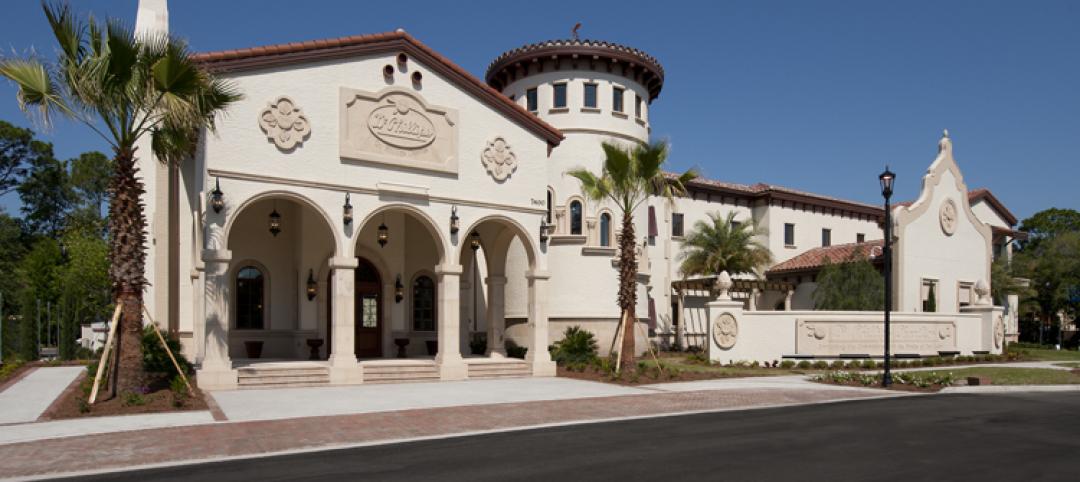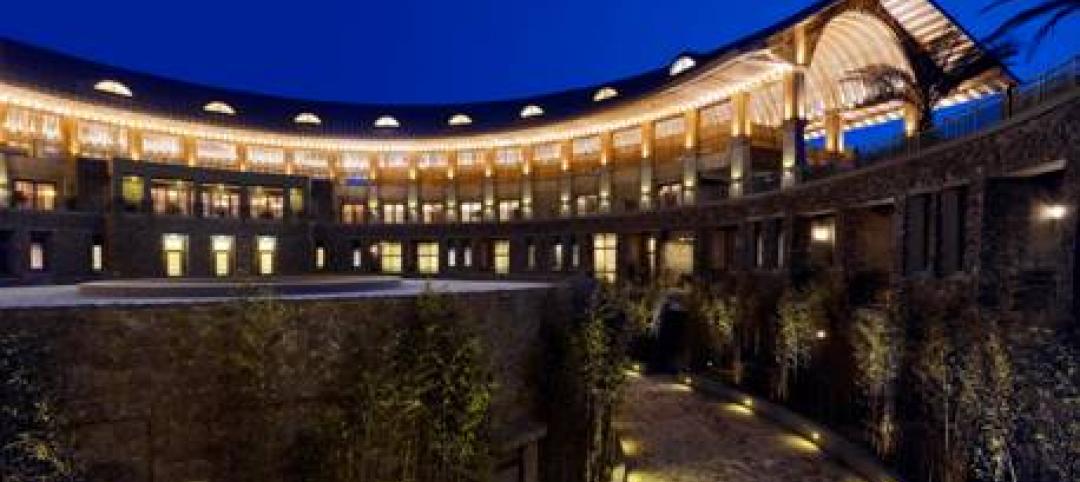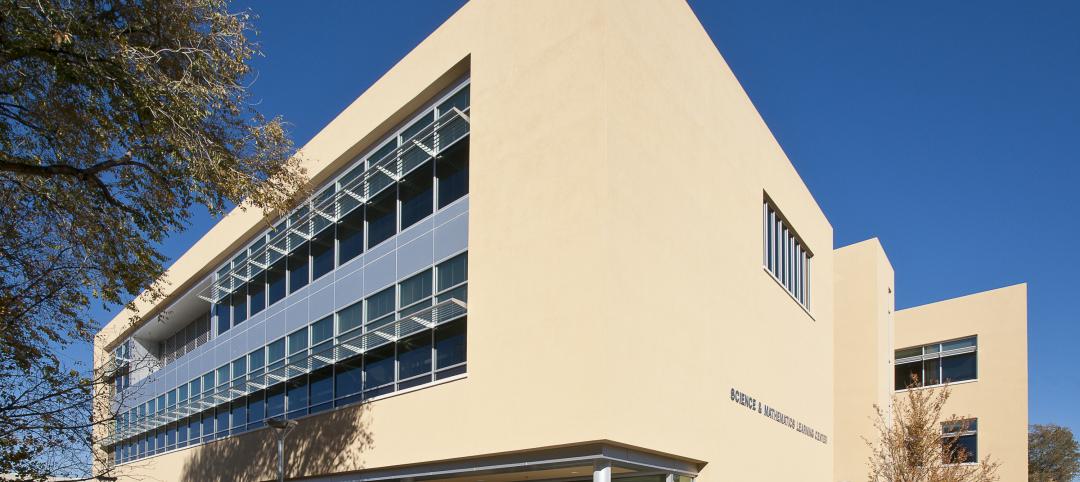More than 600,000 people annually scale the 14,115 feet to reach the summit of Pikes Peak in Colorado Springs, Colo. Until recently, they were greeted by a Summit Complex that had fallen into disrepair. But that’s about to change, as the city of Colorado Springs, in partnership with the U.S. Forest Service, U.S. Army Research Institute of Environmental Medicine, and Colorado Springs Utilities, is building a new Summit Complex and Visitors Center, which breaks ground on June 4.
A second site will consolidate a Plant Building, CSU Communications Facility, and High-Altitude Research Laboratory. The existing Summit House will remain open through the end of construction in the fall of 2020.
The project’s budget is $50 million. The building will be 26,000 sf (compared to the existing center’s 12,000 sf), and include a 200-seat dining area, gift shop, and parking for up to 200 cars.
Pikes Peak, which brigadier general and explorer Zebulon Pike discovered in 1806, is often called America’s Mountain, and its summit is a National Historic Landmark. Its scenic highway let’s anyone, regardless of age or physical condition, reach its apex, with recreation areas and trails along the way.
The intent of this project’s Building Team is to give a seamless, immersive, fully accessible experience with facilities specifically designed for the summit’s harsh environment. “Our goal was to put the experience of Pikes Peak first—the breathtaking views and spectacular beauty—while minimizing the visual impact of architecture on the mountain,” says Alan Reed, FAIA, Design Principal for GWWO Inc./Architects, the Baltimore-based firm that’s the project’s design architect.
RTA Architects is the architect of record. The rest of the Building Team includes HCDA Engineering (SE), Kiowa Engineering (CE) ME Group (MEP), GE Johnson Construction (GC), DHM Design (landscape architect), AECOM (extreme climate consultant), Gallagher & Associates (exhibit design), Jensen Hughes (code and accessibility consultant), The Preservation Studio (historic preservation), NASH Architectural Solutions (specifications), and Webb Foodservice Design (food service design).
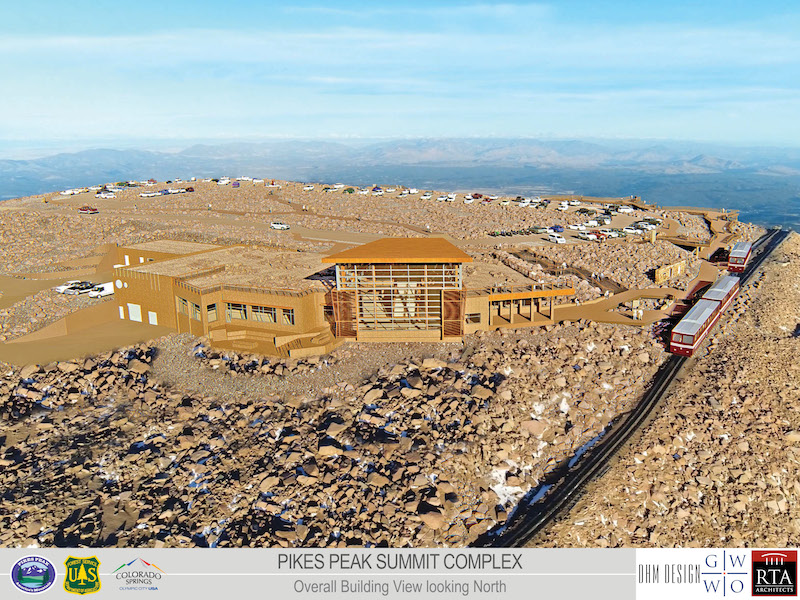
The Summit Complex is being built on the southeast side of the mountain, which will help mitigate the effects of extreme winds and temperatures on the building. Image: RTA Architects, GWWO Inc./Architects
The Building Team sought public input for its final design, whose process began in 2015. The Complex’s exhibits will provide information about the Peak’s formation, discovery, and historical place. Visitors will also be able to experience the mountain via accessible trails and walkways.
The new Visitors Center will be encased in special glass with triple-glazed electrochromic material that darkens to cut glare and solar gain, helping to prevent excessive heat and marred views.
"Because the views are the whole thing," Stuart Coppedge, FAIA, Principal in Charge at RTA Architects, told the Colorado Springs Gazette. "We're really trying to avoid mechanical stuff that can break, that takes a lot of maintenance. The glass darkens to cut the glare. As the sun moves across the sky, the glass would track it around."
The large windows will also feature a ceramic frit that provides UV patterns in the glass that birds can see but people can't.
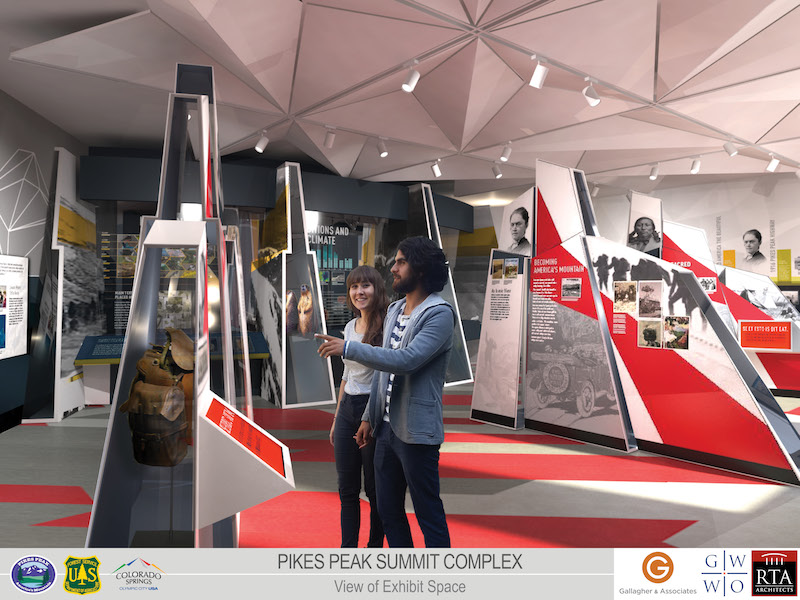
The exhibits will provide information about the mountain's formation, discovery, and historical place. Image: Gallagher & Associates, GWWO Inc./Architects
The project is pursuing LEED Gold and Living Building Challenge certifications. The Summit Complex is expected to produce more energy than it consumes, thereby reducing its operating costs and minimizing its ecological impact. Resilient materials, and its location on the southeast side of the mountain, will help the Complex resist extreme winds, temperatures, and freeze thaw cycles. And the site has been designed to take advantage of the mountain’s hydrological water flows.
”Our entire team embraced the technical challenges of this project with passion, skill and dedication, knowing how important and special Pikes Peak is,” says Coppedge.
Due to construction, parking at the site will be limited and restricted. And the Pikes Peak Cog Railway is closed indefinitely. So last Thursday, the city launched a more frequent shuttle service to the top. Between 30 and 35 shuttles seating 15 to 24 passengers each will make pickups and dropoffs every hour, with the goal of reducing waiting to no more than five minutes. The shuttles will run from May 31 through September 15, which are Pikes Peak’s highest volume months.
Related Stories
| Jan 31, 2012
Fusion Facilities: 8 reasons to consolidate multiple functions under one roof
‘Fusing’ multiple functions into a single building can make it greater than the sum of its parts. The first in a series on the design and construction of university facilities.
| Jan 24, 2012
U of M installs new lighting at Crisler Player Development Center
Energy efficient lighting installed at PDC reduce costs and improves player performance.
| Jan 6, 2012
New Walgreen's represents an architectural departure
The structure's exterior is a major departure from the corporate image of a traditional Walgreens design.
| Dec 7, 2011
ICS Builders and BKSK Architects complete St. Hilda’s House in Manhattan
The facility's design highlights the inherent link between environmental consciousness and religious reverence.
| Dec 5, 2011
SchenkelShultz Architecture designs Dr. Phillips Charities Headquarters building in Orlando
The building incorporates sustainable architectural features, environmentally friendly building products, energy-efficient systems, and environmentally-sensitive construction practices.
| Nov 29, 2011
SB Architects completes Mission Hills Volcanic Mineral Springs and Spa in China
Mission Hills Volcanic Mineral Springs and Spa is home to the largest natural springs reserve in the region, and measures 950,000 sf.
| Nov 22, 2011
Jones Lang LaSalle completes construction of two new stores in Manhattan
Firm creates new global design standard serving as project manager for Uniglo’s 89,000-sf flagship location and, 64,000-sf store.
| Oct 24, 2011
BBS Architects & Engineers receives 2011 Sustainable Design Award from AIA Long Island Chapter
AIA LI also recognized BBS with the 2011 ARCHI Award Commendation for the St. Charles Resurrection Cemetery St. Charles Resurrection Cemetery Welcoming and Information Center in Farmingdale, NY.
| Oct 14, 2011
University of New Mexico Science & Math Learning Center attains LEED for Schools Gold
Van H. Gilbert architects enhances sustainability credentials.


